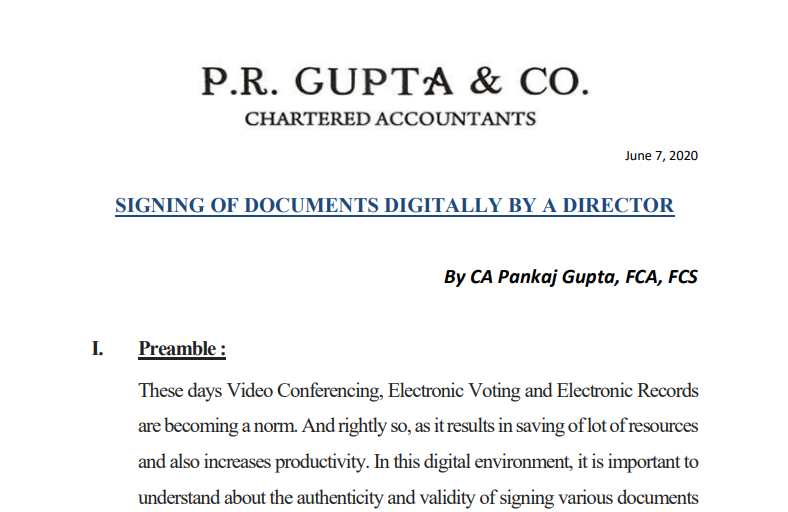Signing of Documents Digitally by a Director
- Signing of Documents Digitally by a Director
- I. Preamble:
- II. Companies Act, 2013
- III. Indian Evidence Act of 1872
- IV. The Information Technology Act, 2000
- V. The Institute of Chartered Accountants of India:
- VI. Questions for discussion:
- Question-1: Which type of documents can be signed by means of Digital Signatures?
- Question-2: When it is mandatory to use Digital Signatures?
- Question-3: Can the documents be signed through Digital Signature where it is not mandatory to do so?
- Documents that cannot be signed digitally.
- Question-4: Does the digital signature has to be affixed by the director himself or can it be affixed by any person with his consent? :
- Question-5: Whether the Power of Attorney (POA) can be oral also or written and the format and manner of executing POA?
- Question-6: whether the Subscriber & POA can be in different places at the time of affixing the DSC?
- Question-7: Can a POA be given to auditors to affix signatures on the various forms to be filed with Govt. Authorities?
- Conclusion:
- Disclaimer:
- Read the copy:
Signing of Documents Digitally by a Director
I. Preamble:
These days Video Conferencing, Electronic Voting, and Electronic Records are becoming a norm. And rightly so, as it results in saving a lot of resources and also increases productivity. In this digital environment, it is important to understand about the authenticity and validity of signing various documents digitally by a Director of a company and other related issues. This has become necessitated in the present day scenario where physical presence has become difficult due to various restrictions in place to contain the spread of the Covid-19 virus.
At present Information Technology Act, 2000 provides for recognition of Electronic/Digital Signatures. However, there is limited reference to Digital signatures in other Acts like Companies Act, 2013, and Indian Evidence Act,1872. Signing by means of the digital signature is optional but in certain cases, it is mandatory to validate electronic records through digital signatures. Let us first study various provisions contained under various Acts, which are relevant to Electronic/Digital signatures before we try to answer various related questions.
Related Topic:
Advisory for Extension of Validity of Documents till 31 March 2021
II. Companies Act, 2013
As per Sub Rule (1) of Rule 8 of Companies (Registration offices and Fees) Rules, 2014, An electronic form shall be authenticated by authorized signatories using a digital signature.
Further, As per Sub Rule (6), A scanned image of documents shall be of original signed documents relevant to the e-forms or forms and the scanned document image shall not be left blank without bearing the actual signature of the authorized person.
Secretarial Standards, (SS-1) and (SS-2), which are mandatory in nature for all companies other than OPC and section 8 companies, do prescribe that where minutes are recorded in digital format, it will bear a “Time Stamp” and will be signed digitally.
III. Indian Evidence Act of 1872
As per Section 3, “Evidence” means and includes-
(1) All statements which the court permits or requires to be made before it by a witness, in relation to matters of facts under inquiry
Such statements are called oral evidence;
(2) All documents including electronic records produced for the inspection of the court
Such statements are called documentary evidence;
As per Section 47A, when the court has to form an opinion as to the electronic signature of any person, the opinion of certifying authority which has issued the electronic certificate is a relevant fact.
As per Section 67A, except in the case of secure electronic signature, if the electronic signature of any subscriber is alleged to have been affixed to an electronic record the fact that such electronic signature is the electronic signature of the subscriber must be proved.
Related Topic:
How A Director Can Sign A Document During Lockdown?
IV. The Information Technology Act, 2000
As per Section 2:
clause (p), Digital Signature means authentication of any electronic record by a subscriber by means of an electronic method or procedure in accordance with the provisions of section 3
clause (ta), Electronic Signature means authentication of any electronic record by a subscriber by means of the electronic technique specified in the second schedule and includes digital signatures
clause (tb), Electronic Signature Certificate means an Electronic Signature Certificate issued under section 35 and includes Digital Signature Certificate.
(zc) , Private Key means the key of a key pair used to create the digital signature
As per Sub-section (1) of section (3), any subscriber may authenticate an electronic record by affixing his digital signature
As per clause (b) of sub-section (2) of section 3A, for the purpose of this section, any electronic signature or electronic authentication technique shall be considered reliable if the signature creation data or the authentication data were, at the time of signing, under the control of the signatory or, as the case may be, the authenticator and no other person.
As per Section 4, where any law provides that information or any other matter shall be in writing or in the typewritten or printed form, then, notwithstanding anything contained in such law, such requirement shall be deemed to have been satisfied if such information or matter is –
(a)Rendered or made available in an electronic form and
(b) Accessible so as to be usable for a subsequent reference
As per Section 5, where any law provides that information or any other matter shall be authenticated by affixing the signature or any document shall be signed or bear the signature of any person, then, notwithstanding anything contained in such law, such requirement shall be deemed to have been satisfied, if such information or matter is authenticated by means of an electronic signature affixed in such manner as may be prescribed by the Central Government.
Explanation: for the purpose of this section “signed” with its grammatical variation and cognate expressions, shall with reference to a person, mean affixing of his handwritten signatures or any mark on any document and the expression “signature” shall be construed accordingly.
As per Section 15, an electronic signature shall be deemed to be a secure electronic signature if the signature creation data, at the time of affixing signature was under the exclusive control of the signatory and no other person.
As per subsection (1) of Section 42, Every subscriber shall exercise reasonable care to retain control of the private key corresponding to the public key listed in his Digital Signature Certificate and take all steps to prevent its disclosure.
V. The Institute of Chartered Accountants of India:
ICAI in one of the announcements made in April 2020, after giving reference of Information Technology Act,2000 and the Indian Evidence Act, 1872, has allowed the members to use Electronic signatures for signing audit reports with a rider that member will need to comply with the requirements relating to signature prescribed in the relevant law or regulation.
VI. Questions for discussion:
Question-1: Which type of documents can be signed by means of Digital Signatures?
It may be noted that digital signatures can only be put on an electronic record. For example, it can be an electronic form, which is specifically designed to verify the contents by affixing a digital signature through the “Digital Signature Certificate” (DSC). DSC can be obtained from the specified agencies appointed by the Govt. in this regard.
DSC can also be affixed on a document which is in “Portable Document Format” (PDF) format. For this purpose, normally a document is saved in “PDF” format and then using Adobe Acrobat software, space is created where the digital signatures need to be affixed, and then using the DSC, the document will be digitally signed. Digital signature stamp includes name, Date, and time of actually affixing the signatures and a few other details.
Question-2: When it is mandatory to use Digital Signatures?
In many statutory Acts, it is now mandatory to affix DSC for verifying the return or forms to be filed with the Govt. authorities. For Eg.in Income Tax Act, most of the corporate tax returns, Tax Audit reports, and certain other forms are to be filed using DSC. In GST, again in most of cases, it is mandatory to affix DSC like in corporate, LLP & Society, Trust, etc. In PF/ESI/Labour Laws also DSC has become mandatory. In the Companies Act, All forms and returns to be filed with MCA needs Digital signatures. Apart from this as per secretarial standard SS-1 and SS-2, where the minutes are kept in Digital format, the same needs to be signed mandatorily through DSC.
The list is very long and various statutory acts need to be referred to for the mandatory use of Digital signatures.
Question-3: Can the documents be signed through Digital Signature where it is not mandatory to do so?
Subrule (1) of Rule 8 of Companies (Registration offices and Fees) Rules, 2014, prescribe for using digital signatures in the case of filing an Electronic Form only. That is for the purpose of filing at the MCA website. Further sub-rule (6) prescribes for actual signatures on original signed documents and scan copy of this needs to be attached to the form. But Section 4 and Section 5 of the Information Technology Act, 2000 give legal sanctity to Electronic Records and Electronic Signatures. Since the provisions of Information Technology Act 2000 starts with a non-obstante clause, these will over-ride the provisions contained in other Acts. Therefore documents can be signed through digital signatures even if it is not provided under a particular Act or contrary is provided. For example, Notices of meetings, Copy of resolutions, financials, balance sheets, minutes, etc. all can all be signed with a digital signature instead of physical signatures in all cases.
Documents that cannot be signed digitally.
As per First Schedule of the Information Technology Act, 2000, for the following documents and transactions the provisions of the Act shall not be applicable
1) A negotiable instrument (Other than a cheque) as defined in section 1 of the Negotiable Instruments Act 1881 2) A power of attorney as defined in section 1A of the Powers –of- Attorney Act,1882
3) A trust as defined in section 3 of the Indian Trust Act, 1882
4) A will as defined in clause (h) of section 2 of the Indian Succession Act,1925 including any other testamentary disposition by whatever name called
5) Any contract for the sale or conveyance of immovable property or any interest in such property.
Question-4: Does the digital signature has to be affixed by the director himself or can it be affixed by any person with his consent? :
Attention to clause (b) of sub-section (2) of Section 3A of IT Act, 2000 is drawn which states that for the purpose of this section any electronic signature or electronic authentication technique shall be considered reliable if the signature creation data or the authentication data were, at the time of signing, under the control of the signatory or, as the case may be, the authenticator and no other person.
Further, as per Section 15, an electronic signature shall be deemed to be a secure electronic signature if the signature creation data, at the time of the affixing signature was under the exclusive control of the signatory and no other person.
Further, as per sub-section (3) of section 42, every subscriber shall exercise reasonable care to retain control of the private key corresponding to the public key listed in his Digital Signature Certificate and take all steps to prevent its disclosure. Further, the words “ to a person not authorized to affix the digital signature of the subscriber” have been omitted from sub-section (1) of section 42 by notification No. S.O.1015(E) w.e.f 19.09.2002. Does it mean that private keys cannot be disclosed even to a person authorized by him? The purpose of the Information Technology Act 2000 is to protect the subscriber. Further section 37 of the Act also allows a person specifically to surrender his DSC through a power of attorney.
Now a Managing Director (M.D)/Director is a person who is in control of the company affairs and even when other officials have delegated the duties, M.D/Director still remains the controller. Further, what will happen if a Director is not computer savvy? What if he has to affix a number of DSC on multiple documents pertaining to the Companies Act, Income Tax Tax Act, P.F Act, GST Act, and numerous other Acts? The manner of putting DSC is different in every Act and complicated and quite technical most of the time. Practically a professional/subordinate employee use different Laptop to do different settings to affix a DSC. There can be even a situation where the Director is in a sound mind but temporarily/permanently incapacitated to sign himself due to medical emergencies. Would he not be entitled to put DSC through his representative?
Now, first of all, it may be noted that the word used is “under the control of Signatory” and no other person. Here signatory will be the subscriber himself. That is the Director who has to sign through a digital signature. Therefore if any other person is using the DSC, then the subscriber will not lose his control if the other person is affixing the DSC with the consent and approval of subscriber and strictly as per the direction of the subscriber.
Further, it may be noted that the words are “under control of signatory”. It does not mean that it should remain in the possession of the signatory all the time. “Possession” will be different than “Control”. So a subscriber may give the possession of DSC to somebody else but can still retain the control. Therefore the intent of the legislature is not to prevent the affixing of DSC by any other person authorized by the subscriber himself.
Question-5: Whether the Power of Attorney (POA) can be oral also or written and the format and manner of executing POA?
In the absence of any prescribed procedure and format, the authority can be written or implied as long as the same is used in a bonafide manner and in a fiduciary capacity.
Question-6: whether the Subscriber & POA can be in different places at the time of affixing the DSC?
In the absence of anything prescribed in this regard, the subscriber (signatory) and the authorized person can be at different places and the place of signing the document should be taken as the place where actually the director is at the time of affixing the signatures.
Question-7: Can a POA be given to auditors to affix signatures on the various forms to be filed with Govt. Authorities?
ICAI code of ethics and Companies Act allow Auditors to prepare and file statutory forms/returns under various Acts in their professional capacity provided the same is approved by the Board of Director. So an auditor should be able to affix the signature of a Director in a bonafide manner and in a fiduciary capacity with the express approval of the Board of Directors. ICAI can bring further clarity into these aspects.
Conclusion:
There can always exist some doubts in the mind of the user of DSC as the law does not prescribe elaborate procedures. Therefore it is very important that Govt. should come out with clear cut detailed guidelines in this regard and especially in these times of “Lockdown” for using Electronic/ Digital signatures under various Acts by Directors or any other persons.
Disclaimer:
(These are authors’ personal views for educational purposes and the reader is advised to consult his Consultant/Adviser in case of any clarification or further guidance. No portion of this article can be quoted or reproduced or used in any manner for any purpose without the permission of the author. No responsibility can be attributed to the author in any manner.)
Read the copy:
If you already have a premium membership, Sign In.
 CA Pankaj Gupta
CA Pankaj Gupta
Mr. Pankaj Gupta is a Fellow Member of the Institute of Chartered Accountants of India (ICAI) and also Fellow Member of The Institute of Company Secretaries of India (ICSI). He has his own CA practice at Noida under the Firm Name “ P.R. Gupta & Co.” and has over 40 years of professional experience dealing in Direct Taxes, Indirect Taxes, Corporate Laws, and FEMA Laws, etc. Clientele includes Non-Residents Individuals and corporate entities. He has remained office-bearer of many professional organizations like ICAI, ICSI, Noida Management Association. He has been instrumental in organizing various professional seminars and has been a speaker at various forums and contributing professional Articles.













